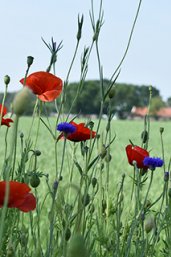Nature-based sustainability transitions

While innovating with nature and natural processes is increasingly recognised as a promising way to achieve sustainability, still little is known about the typical barriers that these innovations face, hindering the development of transition pathways.
Innovating with nature and with natural processes rather than with man-made technologies and infrastructures has attracted increased interest among practitioners and scholars, which is reflected in a range of concepts such as ‘ecosystem services’, ‘nature-based solutions’, ‘eco-engineering’, ‘ecosystem-based adaptation’, ‘agroecology’, ‘nature-inclusive agriculture’ and so on.
Using natural elements and processes rather than conventional technologies to supply services to humans and support economic activities however has several features that hamper their large-scale uptake. Research at the Copernicus Institute of Sustainable Development has identified the specific barriers that two prominent forms of innovating with nature face: urban nature-based solutions in Europe and nature-inclusive agriculture in the Netherlands.
One often observed cause of these barriers is related to the 'multifunctionality' of natural innovations: they usually deliver multiple benefits. Urban nature based solutions such as parks, green roofs and sustainable urban drainage systems can enhance biodiversity, reduce climate change induced risks such as flooding and heat stress, sequester carbon, enhance social cohesion and facilitate recreation and, with that, contribute to health and well-being. This however poses serious coordination challenges as usually multiple actors (within and outside government) are needed to pool resources to invest in these solutions. An additional complexity for nature-inclusive agriculture in particular is that for many of its co-benefits, such as biodiversity and carbon sequestration, there is no, or hardly, a ‘market’.
A second source of barriers to the uptake and upscaling of nature-based innovations is their 'context-specificity': what ‘works’ in one specific setting does not necessarily do so elsewhere. Climatic conditions for instance are an important determinant of the selection of species compositions for green roofs or for multi-functional grasslands. This means that much more experimenting and knowledge development are needed as compared to working with more standardised but monofunctional techniques and technologies, such as synthetic inputs in agriculture that control natural conditions rather than working with these.
These are only two sources of the many barriers that nature-based sustainability transitions face and that hamper their scalability. By closely collaborating with societal actors such as municipalities, national ministries, the European Commission, farmers and agri-food companies, researchers from the Copernicus Institute aim to develop context-specific transition pathways to support the mainstreaming of nature-based innovations.
Researchers
Publications
Scientific publications
- Runhaar, H. (2021), Commentary: Four critical conditions for agroecological transitions in Europe, International Journal of Agricultural Sustainability (published online).
- Dorst, H.M. (2021), Mainstreaming Urban Nature. Uncovering structural conditions for urban nature-based solutions, PhD thesis, Utrecht University.
- Jagt, S. van der, R. Raven, H. Dorst and H. Runhaar (2020), Nature Based Innovation Systems, Environmental Innovation and Societal Transitions, 35, pp. 202 216.
- Runhaar, H., L. Fünfschilling, A. van den Pol van Dasselaar, E.H.M. Moors, R. Temmink and M. Hekkert (2020), Endogenous regime change: lessons from transition pathways in Dutch dairy farming, Environmental Innovation and Societal Transitions, 36C, pp. 137 150.
Professional publications
- Dorst, H., S. van der Jagt, H. Toxopeus and H. Runhaar (2021), Blokkades voor nature-based solutions in duurzame steden, ROmagazine, 39 (3), 63-66.
- Van Dijk, J. R. Verburg, H. Runhaar and M. Hekkert (2018), Een transitie naar natuur-inclusieve landbouw: van ‘waarom’ naar ‘hoe’, Me Judice, May 3 2018.
Media
- December 2018, Van Dijk, J., H. Runhaar, R. Verburg and M. Hekkert (2018), Gastblog NRC website “Innovatieve kennis genoeg, nu nog de toepassing”, 4 december 2018.

